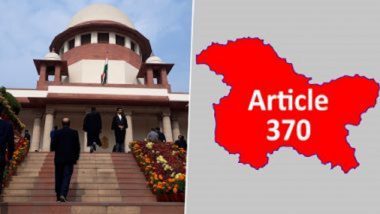New Delhi, September 5:The Supreme Court on Tuesday reserved its verdict on a batch of pleas challenging the abrogation of Article 370 of the Constitution which bestowed special status on the erstwhile state of Jammu and Kashmir. A five-judge bench headed by Chief Justice DY Chandrachud reserved the verdict after a marathon 16-day hearing.
The bench, also comprising Justices Sanjay Kishan Kaul, Sanjiv Khanna, BR Gavai and Surya Kant, heard the rejoinder arguments of senior advocates Kapil Sibal, Gopal Subramanium, Rajeev Dhavan, Zaffar Shah, Dushyant Dave and others on the concluding day of the hearing. The top court said if any lawyer appearing for the petitioners or respondents wishes to file a written submission can do so in the next three days. The submission should not extend beyond two pages, it said. Akbar Lone, Who Raised ‘Pakistan Zindabad’ Slogans in Jammu and Kashmir Assembly, Should File Affidavit Opposing Terrorism, Pledging Allegiance to Indian Constitution: Centre
In the course of the hearing over the past 16 days, the top court heard Attorney General R Venkataramani, Solicitor General Tushar Mehta, senior advocates Harish Salve, Rakesh Dwivedi, V Giri and others on behalf of the Centre and the intervenors defending the abrogation of Article 370. The lawyers dwelt on various issues including the constitutional validity of the Centre's August 5, 2019 decision to abrogate the provision, the validity of Jammu and Kashmir Reorganisation Act, which split the erstwhile state into two Union Territories, challenges to imposition of Governor's rule in Jammu and Kashmir on June 20, 2018 and imposition of President's rule in the erstwhile state on December 19, 2018 and its extension on July 3, 2019. Article 370 Hearing: Cannot Give Exact Timeline for Restoration of Jammu and Kashmir’s Statehood, UT Status Temporary, Centre Tells Supreme Court
Several petitions challenging the abrogation of Article 370 and the Jammu and Kashmir Reorganisation Act, 2019 that divided the erstwhile state into two union territories - Jammu and Kashmir, and Ladakh - were referred to a Constitution bench in 2019.













 Quickly
Quickly


